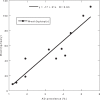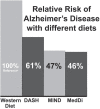Diet's Role in Modifying Risk of Alzheimer's Disease: History and Present Understanding
- PMID: 37955087
- PMCID: PMC10741367
- DOI: 10.3233/JAD-230418
Diet's Role in Modifying Risk of Alzheimer's Disease: History and Present Understanding
Abstract
Diet is an important nonpharmacological risk-modifying factor for Alzheimer's disease (AD). The approaches used here to assess diet's role in the risk of AD include multi-country ecological studies, prospective and cross-sectional observational studies, and laboratory studies. Ecological studies have identified fat, meat, and obesity from high-energy diets as important risk factors for AD and reported that AD rates peak about 15-20 years after national dietary changes. Observational studies have compared the Western dietary pattern with those of the Dietary Approaches to Stop Hypertension (DASH), Mediterranean (MedDi), and Mediterranean-DASH Intervention for Neurodegenerative Delay (MIND) diets. Those studies identified AD risk factors including higher consumption of saturated and total fats, meat, and ultraprocessed foods and a lower risk of AD with higher consumption of fruits, legumes, nuts, omega-3 fatty acids, vegetables, and whole grains. Diet-induced factors associated with a significant risk of AD include inflammation, insulin resistance, oxidative stress, elevated homocysteine, dietary advanced glycation end products, and trimethylamine N-oxide. The molecular mechanisms by which dietary bioactive components and specific foods affect risk of AD are discussed. Given most countries' entrenched food supply systems, the upward trends of AD rates would be hard to reverse. However, for people willing and able, a low-animal product diet with plenty of anti-inflammatory, low-glycemic load foods may be helpful.
Keywords: Advanced glycation end products; Alzheimer’s disease; TMAO; dementia; diet; meat; neuroinflammation; obesity; saturated fat; ultraprocessed foods.
Conflict of interest statement
William B. Grant is an Editorial Board Member of this journal but was not involved in the peer-review process nor had access to any information regarding its peer-review. Steven M. Blake has no conflicts of interest to declare.
Figures




Similar articles
-
Using Multicountry Ecological and Observational Studies to Determine Dietary Risk Factors for Alzheimer's Disease.J Am Coll Nutr. 2016 Jul;35(5):476-89. doi: 10.1080/07315724.2016.1161566. J Am Coll Nutr. 2016. PMID: 27454859 Review.
-
A Brief History of the Progress in Our Understanding of Genetics and Lifestyle, Especially Diet, in the Risk of Alzheimer's Disease.J Alzheimers Dis. 2024;100(s1):S165-S178. doi: 10.3233/JAD-240658. J Alzheimers Dis. 2024. PMID: 39121130 Free PMC article. Review.
-
The Mediterranean, Dietary Approaches to Stop Hypertension (DASH), and Mediterranean-DASH Intervention for Neurodegenerative Delay (MIND) Diets Are Associated with Less Cognitive Decline and a Lower Risk of Alzheimer's Disease-A Review.Adv Nutr. 2019 Nov 1;10(6):1040-1065. doi: 10.1093/advances/nmz054. Adv Nutr. 2019. PMID: 31209456 Free PMC article.
-
Observational and ecological studies of dietary advanced glycation end products in national diets and Alzheimer's disease incidence and prevalence.J Alzheimers Dis. 2015;45(3):965-79. doi: 10.3233/JAD-140720. J Alzheimers Dis. 2015. PMID: 25633677
-
Nutritional patterns associated with the maintenance of neurocognitive functions and the risk of dementia and Alzheimer's disease: A focus on human studies.Pharmacol Res. 2018 May;131:32-43. doi: 10.1016/j.phrs.2018.03.012. Epub 2018 Mar 16. Pharmacol Res. 2018. PMID: 29555333 Review.
Cited by
-
Signs of Alzheimer's Disease: Tied to Aging.Int J Mol Sci. 2025 May 22;26(11):4974. doi: 10.3390/ijms26114974. Int J Mol Sci. 2025. PMID: 40507786 Free PMC article. Review.
-
Country-level incidence of Alzheimer disease and related dementias is associated with increased omega-6-PUFA consumption.Commun Med (Lond). 2025 Jul 31;5(1):326. doi: 10.1038/s43856-025-01059-3. Commun Med (Lond). 2025. PMID: 40745374 Free PMC article.
-
Exogenous prion-like proteins and their potential to trigger cognitive dysfunction.Mol Syst Biol. 2025 Aug;21(8):1004-1029. doi: 10.1038/s44320-025-00114-4. Epub 2025 May 27. Mol Syst Biol. 2025. PMID: 40425815 Free PMC article.
-
Western diets and chronic diseases.Nat Med. 2024 Aug;30(8):2133-2147. doi: 10.1038/s41591-024-03165-6. Epub 2024 Jul 31. Nat Med. 2024. PMID: 39085420 Review.
-
From Plaques to Pathways in Alzheimer's Disease: The Mitochondrial-Neurovascular-Metabolic Hypothesis.Int J Mol Sci. 2024 Oct 31;25(21):11720. doi: 10.3390/ijms252111720. Int J Mol Sci. 2024. PMID: 39519272 Free PMC article. Review.
References
-
- Gustavsson A, Norton N, Fast T, Frolich L, Georges J, Holzapfel D, Kirabali T, Krolak-Salmon P, Rossini PM, Ferretti MT, Lanman L, Chadha AS, van der Flier WM (2023) Global estimates on the number of persons across the Alzheimer’s disease continuum. Alzheimers Dement 19, 658–670. - PubMed
-
- Xu W, Tan L, Wang HF, Jiang T, Tan MS, Tan L, Zhao QF, Li JQ, Wang J, Yu JT (2015) Meta-analysis of modifiable risk factors for Alzheimer’s disease. J Neurol Neurosurg Psychiatry 86, 1299–1306. - PubMed
-
- Yu JT, Xu W, Tan CC, Andrieu S, Suckling J, Evangelou E, Pan A, Zhang C, Jia J, Feng L, Kua EH, Wang YJ, Wang HF, Tan MS, Li JQ, Hou XH, Wan Y, Tan L, Mok V, Tan L, Dong Q, Touchon J, Gauthier S, Aisen PS, Vellas B (2020) Evidence-based prevention of Alzheimer’s disease: Systematic review and meta-analysis of 243 observational prospective studies and 153 randomised controlled trials. J Neurol Neurosurg Psychiatry 91, 1201–1209. - PMC - PubMed
-
- Zhang XX, Tian Y, Wang ZT, Ma YH, Tan L, Yu JT (2021) The epidemiology of Alzheimer’s disease modifiable risk factors and prevention. J Prev Alzheimers Dis 8, 313–321. - PubMed
Publication types
MeSH terms
LinkOut - more resources
Full Text Sources
Medical

